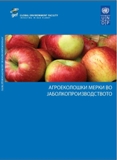Towards an eco-friendly approach
A vision of Prespa Park that enables residents across borders to improve their standard of living by modernizing the production methods by reducing the exhaustion of natural resources guides the initiatives taken. Improved infrastructure, extension of environmentally friendly production techniques, preservation of traditional products and promotion of local production to modern markets add to the picture of prosperous Prespa.
Towards an eco-friendly approach
The life in the Prespa Park revolves around agriculture, but almost
everything about it varies from country to country. The prevailing
cultures are different: intensive bean-monoculture in Greece,
dominating apple production in The Former Yugoslav Republic of
Macedonia, and mostly wheat in Albania. The same applies to the levels
of agricultural mechanization in each country, the use of pesticides
and fertilizers, irrigation techniques, and agricultural waste
treatment. The connections with the food industry, traditional products
and access to markets are also different in Albania, The Former
Yugoslav Republic of Macedonia and Greece. Such a variety presents more
of an agricultural mosaic with a great potential, than a basin-wide,
coherent and environment-friendly production sector.
Challenges and Remedies
Pesticide and fertilizer use, agricultural runoff due to flood irrigation instead of drip irrigation, and solid waste (pesticide packaging and excess crops) are the main challenges for the development of a sustainable agricultural production system.Eutrophication from excessive use of manure and other fertilizers for agriculture is considered as one of the main threats for soil quality, with consequences for the future production of crops. Sodium, phosphorus and potassium reach the lakes through soil, surface and underground waters, with a negative impact on aquatic ecosystems and fish.In the Greek part of the basin intensive bean cultivation is practiced on a total area of around 1,000ha, while organic bean cultivation was introduced in 1998 and is being expanded since. In Albania, use of pesticides and fertilizers is considered very low, which indicates the area’s potential for organic farming.
The excessive use of fertilizers and pesticides has already led to habitat degradation caused by the resistant varieties of pests and diseases, which are hard to eradicate, even by very intensive – and expensive – treatment.
The irrigation and drainage system are the basic elements of the management of water resources in the area. The old, water-consuming, open-channel irrigation system results in high water, energy and labor consumption, higher production costs, erosion of the soil and washing down of the pollutants into the lakes, with a negative impact on its water quality, fish stocks and avifauna.
In Greece, some 700-1200ha of bean cultivation is irrigated. In Albania, the old irrigation system that covered half the arable land in the 1980s has suffered destruction, and only 2.1% of the land is irrigated nowadays.
Lacking solutions for solid waste, farmers often dispose of them along the roads or rivers.




